Ruby Princess blasts ‘baseless attacks’ by NSW premier, top cop and Peter Dutton
The Ruby Princess operator has blasted “baseless attacks” by senior public officials on the honesty of the cruise ship’s captain and senior doctor over the coronavirus fiasco at a powerful inquiry.
Police & Courts
Don't miss out on the headlines from Police & Courts. Followed categories will be added to My News.
The Ruby Princess operator has told an inquiry the cruise ship’s captain and senior doctor have been subjected to “baseless attacks on their honesty by senior public officials.”
Carnival Australia condemned NSW Premier Gladys Berejiklian, Police Commissioner Mick Fuller and Federal Home Affairs Minister Peter Dutton over reports they suggested the liner’s staff may have lied to port authorities about whether there was COVID-19 on board before it docked in Sydney.
Barrister David McLure SC urged Commissioner Bret Walker SC to find that Commodore Giorgio Pomata, Dr Ilse von Watzdorf and the vessel’s port agent personnel acted with integrity in all dealings with government officials.

He took special aim at the state’s top cop for publicly stating: “At no time did I find COVID-19 like symptoms mentioned anywhere in any of the paperwork from Carnival or the Ruby Princess” before 2,700 passengers disembarked at Circular Quay.”
In a May episode of the ABC’s Four Corners program, Mr Fuller questioned whether there was “an honest response from the ship — whether that’s the captain, the doctor or the crew — in relation to the health of the ship as it was coming into the port of Sydney.”
“The Police Commissioner’s statement casting doubt on the honesty of Commodore Pomata and Dr von Watzdorf was completely unjustified, and cannot have been based on any proper assessment of the evidence he claimed to have personally reviewed,” Mr McLure wrote in his closing submissions.
He said phone call transcripts and emails sent between Carnival and NSW Ambulance, NSW Health and the NSW Port Authority, as well as the Ruby Princess acute respiratory disease log, proved this.
“Commodore Pomata and Dr von Watzdorf are entitled to vindication,” Mr McLure said.

NSW Police lawyer Jade Francis called on the commissioner to reject Carnival’s assertions, saying the inquiry is not an appropriate vehicle to air such grievances.
She said with a criminal probe underway, Mick Fuller was merely asking questions “any investigator in the state would pose.”
The inquiry’s final report is due next month, and Mr Walker said he would consider whether it was appropriate to make findings about the police commissioner’s comments.
“I hope I can assure everyone I’m not going to be prejudiced by the publication of these statements previously,” he said.
“I don’t see this inquiry as having as a function chasing down all grievances, fairly or not so fairly felt by people, concerning public utterances about what was a notorious episode in public health administration.”
The inquiry is investigating why NSW Health deemed the ship a low biosecurity risk and allowed guests to depart on March 19 without proper screening – a decision that was ultimately responsible for the country’s largest cluster of infections.
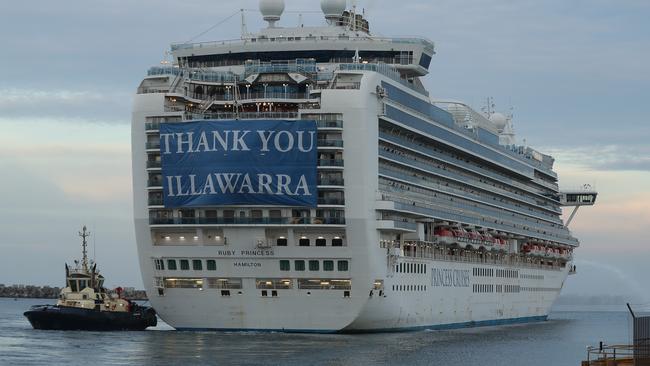
The department’s barrister Gail Furness SC noted that Dr von Watzdorf apologised for failing to update a declaration listing passengers who were ill until the day after they were disembarked from the ship because “the day did not have enough hours’’.
But Carnival insists there was no requirement to update the acute respiratory disease log.
“The ship’s doctor offered to provide regular updates, but was told in effect that this was not necessary,” Mr McLure wrote.
“NSW Health knew that there was an influenza outbreak on board the Ruby Princess, but did not ask for any further updates when notifying the ship at 1707 on 18 March 2020 that there would not be an on-board assessment.”
Mr McLure added that 20 additional people presented to the medical centre after the ARD log was sent to NSW Health on March 18 — less than half the number of sick people who presented to the clinic the previous day.
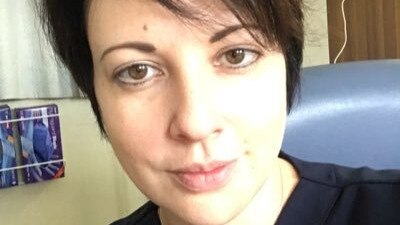
The department said there was no need for the acute respiratory disease log to be given to all members of the risk assessment expert panel, but noted the sole physician to read it on March 18 - Professor Mark Ferson - admitted he probably only scanned it.
Had the log been read more carefully, officials would have spotted the spike in illnesses and number of overseas travellers, delayed disembarkation and boarded the ship for extensive screening, Ms Furness said.
NSW Health conceded that securely transporting guests from the ship into mandatory quarantine would have been more likely to reduce community COVID-19 transmission than letting them scatter into voluntary home self isolation.
“We don’t have to pretend that we don’t read newspapers or listen to the radio. Hotel quarantine would perhaps not be so straightforwardly regarded as more secure nowadays,” Mr Walker said.
While Premier Berejiklian has deployed army troops to enforce hotel quarantining, the Victorian government used private contractors, with reports those security guards had sex with guests which sparked major outbreaks in Melbourne.
“Leaving aside Victoria…” Ms Furness began.
“We can’t. The empirical experience, alas, shows that one of the problems of what might otherwise be a virtue of centralised control is that if something goes wrong, it’s effect is multiplied,” Mr Walker said.
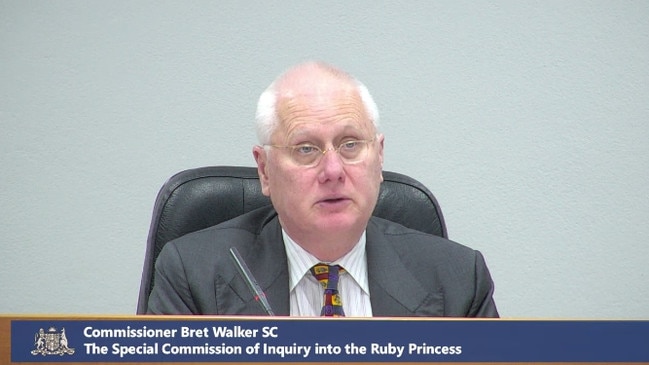
NSW Health accepts its expert panel had been guided by an outdated protocol that did not take into account a March 10 guideline change from the Communicable Diseases Network of Australia, which included all international travel in COVID-19 suspect case criteria.
“We accept that all of those on board, with or without a fever... were a suspect case, because they had travelled internationally to New Zealand, if not elsewhere,” Ms Furness said.
“No ship was a low risk anymore. Dr (Jeremy) McAnulty has clearly conceded as the primary architect of the procedure, that it should have gone.”
Ms Furness insisted that prior to March 10, the panel’s graded-risk scale of low, medium and high was a perfectly appropriate system, but Mr Walker wasn’t convinced there was ever any justification for that approach.
“This is happening as we speak here today, between Victoria and NSW. Once you’ve got one (suspect case) there’s a risk which is worth attending to,” Mr Walker said.
NSW Health accepted that the panel’s pre-arrival risk assessment form should have been updated with the new CDNA guidelines, which was primarily the task of epidemiologist Kelly-Anne Ressler.
“It’s worth repeating commissioner, this was a very busy time,” Ms Furness said.
“It’s an important point, but it’s most unlikely to be what I might call a satisfactory or satisfying explanation,” Mr Walker replied.
The inquiry hearing wrapped up on Friday, and the commissioner will now prepare his final recommendations.
Thursday, July 16
A heavyweight executive for the operator of the Ruby Princess has defended the dismal coronavirus test numbers on board the notorious cruise ship as “reasonable.”
Carnival Cruise Line’s senior vice president Dr Grant Tarling was addressing what inquiry commissioner Bret Walker SC has condemned as a “grossly deficient number of swabs” amid a pandemic.
Next month Mr Walker will hand down his final report investigating how 2,700 people were allowed to disembark the vessel in Sydney on March 19 without proper health checks, in what has become the nation’s largest source of infection.
When the Ruby Princess left Circular Quay on March 8 on a round trip to New Zealand it had 29 viral swabs for COVID-19 testing, in addition to a supply of rapid influenza test kits.
With 3,795 people on board, there were not enough coronavirus tests to manage an outbreak as explicitly required under state government policy.
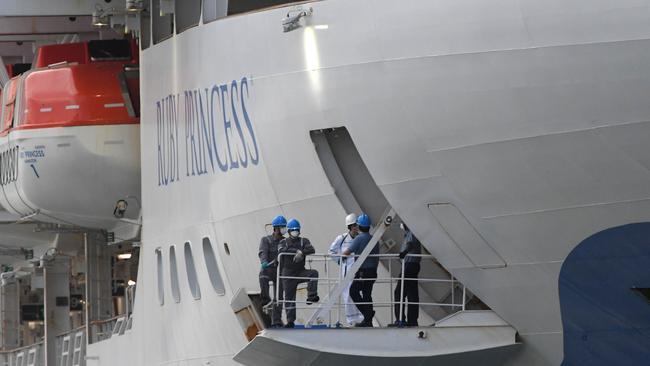
But Dr Tarling insists that number was “reasonable” because fewer than 38 people would be expected to report an influenza-like-illness during the voyage, based on a one per cent outbreak threshold definition.
“I consider that the ship’s medical personnel took reasonable steps to try to obtain additional swabs from ports in New Zealand,” the group’s chief medical officer wrote in a statement.
“The plan to obtain additional swabs in New Zealand was thwarted by unexpected changes to the ship’s itinerary.”
On March 15 the Ruby Princess was forced to leave Napier and sail back to Sydney early after the Australian government moved to shut its maritime borders to cruise ships.
Multiple emails tendered to the inquiry reveal the ship’s doctor had been urgently trying to source masks and swabs from Carnival, where all supply chain issues are handled remotely in the United States.
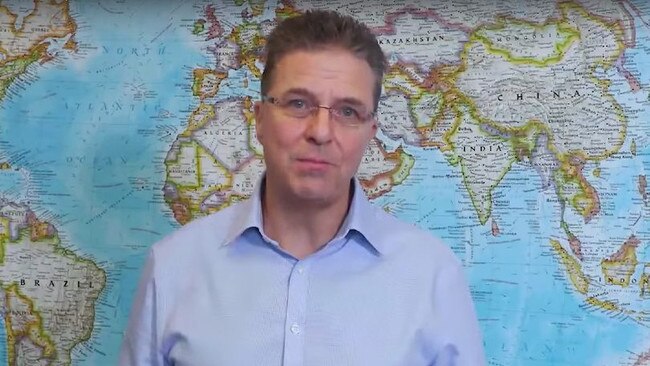
Dr Ilse Von Watzdorf had been ordering large amounts of swabs since late February, but the delivery time was up to four weeks, so she tried to source them from New Zealand suppliers and NSW Health.
The liner was down to just six swabs the day before an earlier docking of the ship in Sydney on March 8, when NSW Health workers who boarded the ship for screening provided 25 of their leftover coronavirus tests to Carnival.
“I would not be able to guarantee we have enough masks for all the people that might present tomorrow, as well as have stock for the next cruise,” Dr Von Watzdorf wrote in an email to NSW Health on March 7.
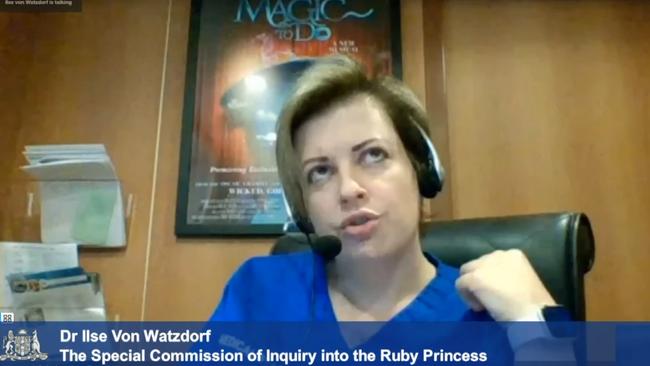
“The same applies for swabs – we do not have stock to swab the affected individuals.”
Dr Tarling also denied that Carnival avoided announcing free on board medical consultations in an effort to put profits over the health of its customers.
“If some passengers were not refunded the charge, that was an unintentional oversight,” he said.
On June 23, COVID-19 survivor and guest Paul Reid testified that Carnival called him the day before he was due to give evidence to announce they’d refund his nearly $250 medical centre visit fee.
The inquiry continues.
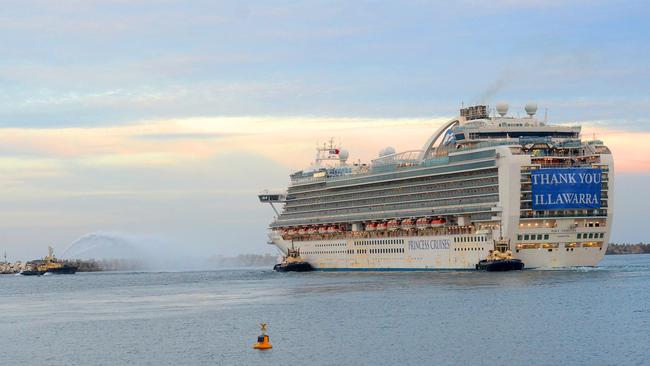
Wednesday, July 15
It was “unacceptable” that COVID-19 testing for sick Ruby Princess passengers was delayed because crucial samples were not flagged as a priority by the NSW government’s laboratory, an inquiry heard.
More than 20 coronavirus deaths across Australia have been linked to the 2700 passengers who disembarked the cruise ship in Sydney in March – 24 hours before swab results revealed some had tested positive to the disease.
In his closing submissions, counsel assisting Richard Beasley SC urged the inquiry’s commissioner to find that the slow speed of testing for the 15 swabs was unreasonable.
NSW Health had deemed the liner a low biosecurity risk, but Mr Beasley said whether the risk was “catastrophically high or unbelievably low, these samples should have been tested immediately”
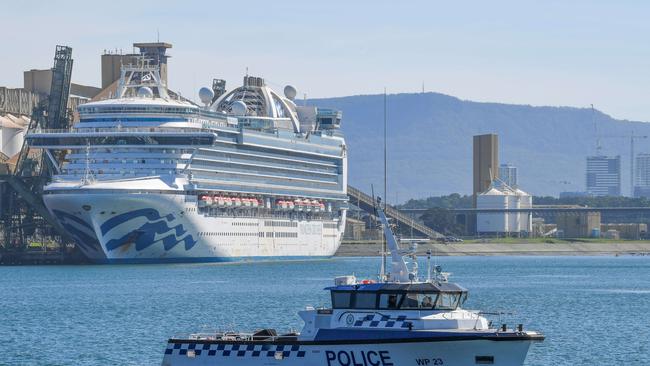
Commissioner Bret Walker SC also questioned why Carnival Australia’s significant noncompliance on COVID-19 testing “should not be judged harshly.”
“I think there is room for criticism that such a large enterprise was not able, in a timely fashion, to meet a global emergency with basic supplies,” he said on Wednesday.
Mr Beasley said the vessel should not have even been granted permission to dock at Circular Quay until the handful of test results were known.

NSW Health should have instead boarded the ship to test sick guests, and everyone should have been confined to their cabins until the first positive COVID-19 test result was confirmed.
At that point, all passengers and crew should have been securely transported from the ship into monitored quarantine as opposed to voluntary home self isolation, the inquiry heard.
“There is no issue of deprivation of liberty or inconvenience with flights that outweighs that that should have occurred,” Mr Beasley said.
What you get as a Daily Telegraph subscriber
The risk assessment expert panel had been guided by an outdated protocol that did not take into account a March 10 guideline change from the Communicable Diseases Network of Australia, which included all international travel in COVID-19 suspect case criteria.
Several panellists conceded that had that “oversight” been avoided, the ship’s biosecurity rating would have risen from low to medium risk, which would have mandated health officers to board the vessel to conduct extensive screening before disembarkation.
“It is a serious mistake,” Mr Beasley said.

Mr Beasley said it was “never a good idea” to develop a graded-risk scale of low, medium and high to guide NSW Health in assessing cruise ships seeking to disembark passengers amid the COVID-19 pandemic.
“I don’t make the submission that there was something negligent or unreasonable in the health professional’s decision,” he said.
The expert panel deemed the liner low risk based only on a subset of passengers with a fever and not a broader group who had a respiratory illness.
This was despite the knowledge that coronavirus symptoms do not always include a fever, which was outlined in the March 10 guideline change.
Mr Beasley said the classification system becomes “meaningless” when the consequences of even a low risk coming to fruition are catastrophic.
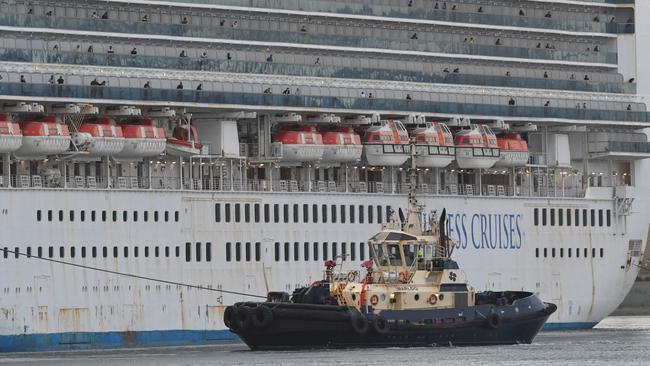
The expert panel’s pre-arrival assessment form stated only 0.94 per cent of guests had influenza-like illness – just under the one per cent threshold that would have forced NSW Health to delay disembarkation until coronavirus test results came back.
Mr Beasley said the acute respiratory disease log was given to the panel some 30 hours before the Ruby Princess docked, and the ship’s doctor should have updated NSW Health with the spiking number of people with symptoms.
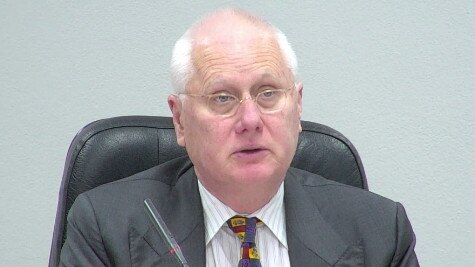
Regardless, it should have been “crystal clear” the rate of infection would have risen well over the arbitrary one per cent level by the time guests disembarked, the inquiry heard.
Mr Beasley said Carnival Australia ignored a “very clear obligation” to inform its guests – particularly elderly and medically vulnerable people – that there were suspect cases on board to allow them to take precautions such as isolating in their cabins.
RELATED NEWS
‘Unacceptable’ swabs sent to NSW Health: Inquiry
Govt acted too late on cruise ship ban: inquiry
A NSW Port Authority worker complained that the Ruby Princess captain lied when he told a marine pilot there were no ill guests on board during an earlier docking of the ship in Sydney on March 8, but Mr Beasley chalked that up to a misunderstanding.
“The evidence does not support the finding that the commodore deliberately lied at any stage,” he said.
Mr Beasley suggested there should be no adverse findings against the Port Authority, which initially denied the ship permission to dock late on March 18 following a call from an ambulance officer who said two passengers on board needed “COVID beds” in hospital.
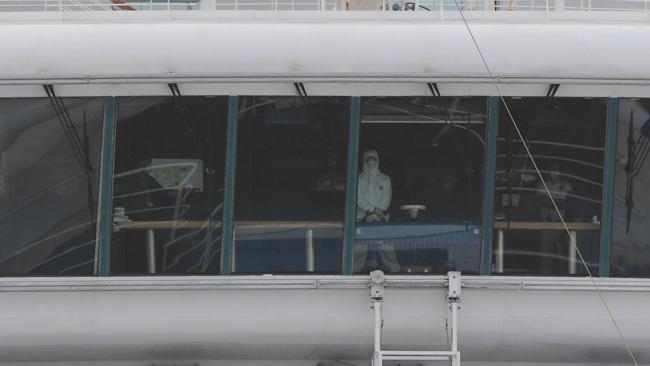
However in the early hours of March 19 the Authority reversed its decision following advice from senior Carnival Australia manager Paul Mifsud, who said the ambulance bookings weren’t linked to coronavirus, the inquiry has heard.
The two passengers later tested positive to coronavirus and one died, but Mr Beasley said Mr Mifsud had been doing his best to tell the truth with the limited information he had.
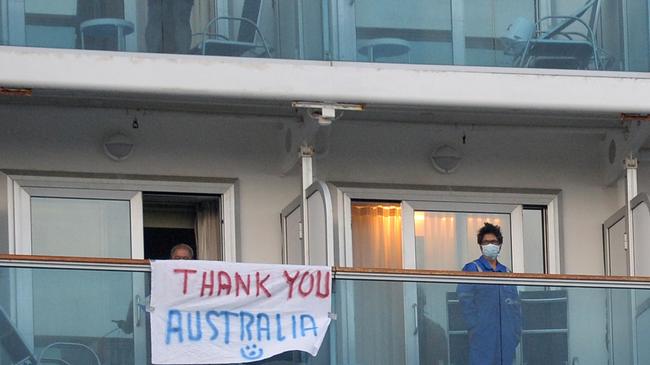
Mr Walker labelled a draft review of the debacle which glosses over several state government failings and shifts blame onto the federal government as a “really disappointing” self assessment by NSW Health.
“It would be wrong to regard as sinister the inaccuracies (and) inappropriate emphases that I have identified in the perhaps crude label of spin,” he said.
A global transport union has slammed the “sham” inquiry for ignoring safety standards for 1200 crew who were forced to remain on the contaminated ship after passengers disembarked on March 19.

Calls from the International Transport Workers’ Federation for NSW Premier Gladys Berejiklian to expand the inquiry’s terms of reference have gone unanswered, and consequently Mr Beasley said “it would not be lawful” to examine what the union called the “second phase of the crisis”.
“No one in this commission is unconcerned about what happened to the health of crew of this ship after the 19th of March,” he said.
Mr Walker’s final report into what caused the country’s largest outbreak is due next month as the inquiry continues.
